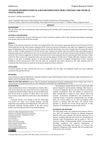 9 citations,
January 2015 in “Springer eBooks”
9 citations,
January 2015 in “Springer eBooks” The document concludes that managing PCOS involves treating symptoms, regulating periods, and reducing health risks, with specific medications for fertility and metabolic issues.
 23 citations,
February 2021 in “Journal of Endocrinological Investigation”
23 citations,
February 2021 in “Journal of Endocrinological Investigation” Betacoronaviruses, like COVID-19, may cause hormone system dysfunction and affect disease susceptibility and severity.
 21 citations,
February 2021 in “BMJ case reports”
21 citations,
February 2021 in “BMJ case reports” Anabolic steroid users may face higher risk of severe COVID-19.
 46 citations,
June 2018 in “American Journal of Clinical Dermatology”
46 citations,
June 2018 in “American Journal of Clinical Dermatology” Hair loss is common in lupus patients and can be permanent or reversible, depending on the type, with various treatments available.
 26 citations,
December 2015 in “International Journal of Dermatology”
26 citations,
December 2015 in “International Journal of Dermatology” Trichodynia is a painful scalp condition linked to hair loss and inflammation, often with anxiety, affecting more women and needing better treatment options.
 15 citations,
March 2015 in “Australasian Journal of Dermatology”
15 citations,
March 2015 in “Australasian Journal of Dermatology” Seborrhoeic dermatitis may cause a condition called "seborrhoeic folliculitis," leading to chronic scalp inflammation and scarring hair loss.
 June 2017 in “Journal of evolution of medical and dental sciences”
June 2017 in “Journal of evolution of medical and dental sciences” Most lupus patients in coastal Kerala had skin-specific lesions that could help diagnose the disease, and non-specific skin issues were linked to more severe, systemic lupus.
 129 citations,
November 2005 in “Internal Medicine Journal”
129 citations,
November 2005 in “Internal Medicine Journal” Early detection and intensive treatment of diseases caused by Staphylococcus aureus toxins are crucial for reducing severe health effects.
 June 2024 in “Research Square (Research Square)”
June 2024 in “Research Square (Research Square)” Copper deficiency is linked to post-COVID-19 hair loss in women.
 76 citations,
November 2009 in “Medical Clinics of North America”
76 citations,
November 2009 in “Medical Clinics of North America” Hormones, especially androgens, play a key role in acne, which can be a symptom of systemic diseases like PCOS and may require targeted treatment.
 80 citations,
June 2020 in “Dermatopathology”
80 citations,
June 2020 in “Dermatopathology” COVID-19 can cause various skin lesions, which may result from the virus and immune response, and are not directly linked to illness severity.
1 citations,
January 2022 in “Annals of Dermatology” A new mutation in the MBTPS2 gene causes a mild form of IFAP syndrome.
 September 2024 in “Skin Research and Technology”
September 2024 in “Skin Research and Technology” AFM can help diagnose lichen planopilaris by identifying specific hair structure changes.
 42 citations,
August 2021 in “Narra J”
42 citations,
August 2021 in “Narra J” Many COVID-19 survivors experience long-lasting symptoms, including hair loss and psychological issues.
3 citations,
August 2018 in “Therapeutics and Clinical Risk Management” Corticosteroid therapy for alopecia areata can cause severe hip bone damage.
 30 citations,
September 2020 in “Journal of Patient-Reported Outcomes”
30 citations,
September 2020 in “Journal of Patient-Reported Outcomes” Alopecia Areata (AA) causes significant emotional distress, including feelings of embarrassment, depression, and anxiety, and impacts social interactions and daily activities.
 January 2024 in “JEADV Clinical Practice”
January 2024 in “JEADV Clinical Practice” Patients with certain skin diseases are willing to spend significant time on treatment, indicating a high impact on their lives and a need for better treatments.
 February 2024 in “Curēus”
February 2024 in “Curēus” Long COVID is more common in those with severe initial infections, but not linked to blood group.
 1 citations,
April 2019 in “Journal of Investigative Dermatology”
1 citations,
April 2019 in “Journal of Investigative Dermatology” Patients with autoimmune blistering diseases experience a reduced quality of life, with the need for better measurement tools, especially for those with mucous membrane pemphigoid.
8 citations,
January 2016 in “Indian Journal of Pharmacology” Finasteride and dutasteride can cause severe, lasting side effects.
 April 2023 in “Dermatology practical & conceptual”
April 2023 in “Dermatology practical & conceptual” Some patients with hair loss after mild COVID-19 had positive tests for certain autoantibodies.
 June 2008 in “The Journal of Urology”
June 2008 in “The Journal of Urology” Men with urinary symptoms are more likely to have erectile dysfunction, and there's a debate about research methods and authorship ethics.
26 citations,
July 2012 in “Journal of family planning and reproductive health care” The document says that hirsutism in women usually needs hair removal and hormone treatment to manage symptoms and improve well-being.
 14 citations,
February 2016 in “Journal of Obstetrics and Gynaecology Research”
14 citations,
February 2016 in “Journal of Obstetrics and Gynaecology Research” Blood tests are needed to confirm high male hormone levels in women with PCOS, as physical signs alone are not reliable.
 21 citations,
August 2003 in “Seminars in oncology nursing”
21 citations,
August 2003 in “Seminars in oncology nursing” Nurses are crucial in managing chemotherapy side effects for ovarian cancer patients to improve their quality of life.
 2 citations,
January 2022 in “Clinical, Cosmetic and Investigational Dermatology”
2 citations,
January 2022 in “Clinical, Cosmetic and Investigational Dermatology” The refined wash test is a reliable way to measure daily hair loss and can tell the difference between different types of hair loss.
 31 citations,
August 2022 in “Frontiers in Oncology”
31 citations,
August 2022 in “Frontiers in Oncology” Photobiomodulation therapy helps manage cancer treatment side effects but needs more research for optimization.
 1 citations,
July 2021 in “Journal of Skin and Sexually Transmitted Diseases”
1 citations,
July 2021 in “Journal of Skin and Sexually Transmitted Diseases” Lipedema is a painful fat disorder in women that's hard to treat, often worsens with hormonal changes, and requires symptom-focused therapies.
 April 2019 in “Journal of Investigative Dermatology”
April 2019 in “Journal of Investigative Dermatology” The research found that certain characteristics like age, sex, race, marital status, and education level can influence whether alopecia patients stick to their hair loss treatment with topical minoxidil.
 10 citations,
September 2022 in “Psychiatry and Clinical Neurosciences”
10 citations,
September 2022 in “Psychiatry and Clinical Neurosciences” Long COVID affects over half of COVID-19 survivors, causing a range of symptoms like fatigue and neurological issues, with no specific treatment yet.


























